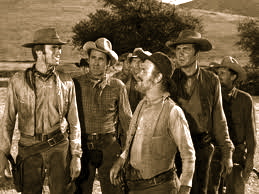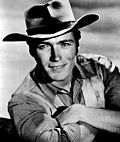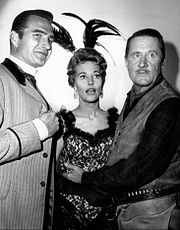Rawhide (TV series)

Rawhide: Incident at Rojo Canyon
 Rawhide is an American Western series that aired for eight seasons on the CBSnetwork on Friday nights, from January 9, 1959 to September 3, 1965, before moving to Tuesday nights from September 14, 1965 until January 4, 1966, with a total of 217 black-and-white episodes. Starring Eric Fleming and Clint Eastwood, the series was produced and sometimes directed by Charles Marquis Warren who also produced early episodes of Gunsmoke.
Rawhide is an American Western series that aired for eight seasons on the CBSnetwork on Friday nights, from January 9, 1959 to September 3, 1965, before moving to Tuesday nights from September 14, 1965 until January 4, 1966, with a total of 217 black-and-white episodes. Starring Eric Fleming and Clint Eastwood, the series was produced and sometimes directed by Charles Marquis Warren who also produced early episodes of Gunsmoke.
Spanning seven and a half years, Rawhide was the fifth-longest-running American television Western, beaten only by eight years of Wagon Train, nine years of The Virginian, fourteen years of Bonanza, and twenty years of Gunsmoke.
Synopsis
 Clint Eastwood as Rowdy Yates
Clint Eastwood as Rowdy Yates
Set in the 1860s, Rawhide portrays the challenges faced by the men of a cattle drive. There are 20-25 riders looking after 3,000 head of cattle. Gil (short for Gilbert Favor, episode 181) revealed this is about the maximum manageable size for a herd of cows. The cattle drive begins in San Antonio, Texas, and makes its way along the Sedalia Trail (Sedalia, the final destination, is in Missouri about 50 miles east from Kansas City). In later seasons Favor and crew push the cattle up the newer Chisum trail rather than the Sedalia Trail. The herd is estimated to be worth about $50,000–60,000 (about 1.3 million in 2010 dollars if sold at market and represents a pool of cattle from approximately 200 owners. The trail boss carries a considerable sum of cash for all necessities and all possible emergencies. Pay was a dollar a day and “all you can eat” for the drovers. Riding drag was often a punishment since it was behind the herd, so a rider would pick up all of the herd’s dust. Drives had a remuda, a pool of extra horses. If something happened to a man’s horse, he would be useless without an instant replacement.
Usually the episode would be introduced by Gil Favor but sometimes by others. The typical Rawhide story involved drovers, portrayed by Eric Fleming (trail boss Gil Favor) and Clint Eastwood (ramrod Rowdy Yates), coming upon people on the trail and getting drawn into solving whatever problem they presented or were confronting. Sometimes one of the members of the cattle drive or some of the others would venture into a nearby town and encounter some trouble from which they needed to be rescued. Rowdy Yates was young and at times impetuous in the earliest episodes and Favor had to keep a tight rein on him. Favor was a savvy and strong leader who always played “square” with his fellow men. He was a tough customer who could handle the challenges and get the job done. (Producer Charles Warren called on the diary written in 1866 by trail boss George C. Duffield to shape the character of Favor). Although Favor had the respect and loyalty of the men who worked for him, there were a few times when people, including Yates, were insubordinate under him after working too hard or after receiving a tongue lashing. Favor had to fight at times and almost always won. Some of the stories were obviously easier in production terms but the peak form of the show was convincing and naturalistic, and sometimes brutal. Its situations could range from parched plains to anthrax, ghostly riders to wolves, cattle raiding, bandits, murderers, and so forth. A problem on such drives was the constant need for water, and the scout spent much of his time looking for it, sometimes finding water holes, even rivers had dried up. In some ways it was similar to the TV series Wagon Train, that debuted on NBC on September 18, 1957.
 Eric Fleming as Gil Favor with Lola Albright and Allyn Joslyn, 1964.
Eric Fleming as Gil Favor with Lola Albright and Allyn Joslyn, 1964.
The series was not afraid to face tough issues. Robert Culp played an ex-soldier on the drive who had become dangerously addicted to morphine. Mexican drover Jesus (pronounced hey soos) faced racism at times (from people outside of the crew). There was still anger left over from the Civil War which had ended only four years earlier, and the “Poco Tiempo” episode reveals that Rowdy’s father’s name was Dan, that Rowdy came from Southwestern Texas, and that he went off to war at 16 (being later held in a Union prison camp). Trail boss Favor had been a Confederate Captain in the war. ‘Incident on The Edge of Madness’ in season one, guest starring Lon Chaney Jr., saw Favor’s old commanding officer attempting to enlist the aid of Favor and his men to start the ‘New Confederacy of Panama‘ much to Favor’s dismay, in this episode we learn that Favor and Nolan were in the Confederate forces up on Marye’s Heights at the Battle of Fredericksburg, and ‘felt shamed’ at having to gun down so many Union soldiers. There were still Native Americans about, though often not that wild, some still wanted cattle as payment for going through their land. There were rough characters in the shows and Gil Favor was tortured by having his face held near a fire in one episode. In another, ‘Incident of The Town in Terror’, people thought a sick Rowdy Yates had “the plague” (anthrax) and guns were used to enforce quarantine of the cattle drovers outside the town. There were also cattle rustlers, including Commancheros.
The show could on occasions be eerily atmospheric. ‘Incident With an The Executioner’ featured guest star Dan Duryea as a mysterious dark rider seen on the hillside following the herd, ‘Incident of The Haunted Hills’, guest starring John Drew Barrymore, featured a sacred Native American burial ground, ‘Incident of The Druid Curse’ and season two’s ‘Incident of The Murder Steer’, guest starring James Franciscus, (where anyone sighting a rogue steer with ‘Murder’ carved on its side soon after dies….based on an actual legend of the old west ), plus episodes with ghost towns, cattle with horns lit up by St. Elmo’s fire at dusk, with cowboys struck by lightning, plus a strange totally enclosed gypsy wagon, apparently steering itself, repeatedly turning up etc., all stand out as curiously ‘spooky’ tales for a bustling dusty cattle drive…the show’s often stark incidental music suited these stories perfectly.
 Eric Fleming and Linda Cristal, 1959
Eric Fleming and Linda Cristal, 1959
In episode 67, “Incident Near the Promised Land” (most episode titles began with “Incident” until Bruce Geller and Bernard L. Kowalski became the producers for season six), the cattle drive finally reached Sedalia (for the first time in the series). Unusually, episode 68 continues on from that, where the cattle have been sold and the men celebrate in town and decide on their futures with even Favor thinking of leaving the business. Instead of the usual ending wherein Gil Favor tells his men to: “Head ’em up! Move ’em out!” and the cattle move off, this episode had the end titles over a view of a Sedalia Street. Episode 69 sees Gil Favor visiting his two daughters, Gillian and Maggie, who live with their Aunt Elena in Philadelphia. In episode 70, a number of the men are back together and heading back to San Antonio about 650 miles away, with a herd of horses (used in the titles) instead of cattle. Episode 71 sees a new cattle drive ready to go but the owner of 1600 of the cattle wants to be in charge, so Favor reluctantly signs on as a ramrod, but after problems, Favor becomes boss again at the end of the show. These five episodes made up one storyline instead of the usual single episode stories which could have been set anywhere in the West.
Favor had many bad moments in the series but none worse than the “Lost Herd” episode, wherein close to drive’s finish, he wants to beat another herd to town, to get the best prices. He takes a narrow shortcut; there’s thunder and lightning and the herd stampedes over the cliffs leaving him just 9 out of 3000 cattle when the drive reaches town. He doesn’t have the money to pay the drovers off and has to face the owner (Royal Dano) whose cows he has lost, knowing that he might never work in the business again.
From the second season, episodes began to feature individual cast members, notably Clint Eastwood’s Rowdy Yates (sole star in ‘Incident on The Day of The Dead’ which opens season two), later both Scout Pete Nolan (Sheb Wooley) and even cook G. W. Wishbone (Paul Brinegar) were featured as leads, while Eric Fleming’s Gil Favor remained in overall charge.
Sheb Wooley’s figurehead character scout Pete Nolan departs as a regular cast member after ‘The Deserter’s Patrol’ (season four, ep 18, trans 9 Feb 1962), however Nolan returns for a one off episode ‘Reunion’ (episode 26, 6 April 1962), and several years later for a further nine episodes in season seven from ‘Texas Fever’ (episode 18, 5 February 1965).
Charles H. Gray’s character Clay Forester, having made three earlier guest appearances in season four (from ‘The Inside Man’, episode 6) initially a villainous character, then reforms and replaces Nolan as Favor’s new scout from ‘The Greedy Town’ (season four, episode 19), Gray remained for the rest of season four and five (however a fair number of latter episodes have just a ‘credit’ for him). Clay Forrester made a return appearance later in ‘Incident of El Toro’ in season six (episode 26, 9 April 1964)
Two other minor semi-regular cast members were ‘Toothless’ (William R.Thompkins) in seasons five and six, plus one season seven appearance (sometimes uncredited), and ‘Yo Yo’ (Paul Comi) who makes six appearances in season seven.
 John Ireland and Raymond St. Jacques, 1965.
John Ireland and Raymond St. Jacques, 1965.
The eighth and final season saw Eric Fleming controversially depart the series after an apparent disagreement with producers. Clint Eastwood was promoted to series star as Rowdy Yates finally became the trail boss (this was hinted at earlier when several times Favor made it clear he was training up the young ramrod to eventually ‘step into his boots’ and become trail boss). The impression given is this was a later cattle drive with Yates now in charge, at a time after Favor had either ‘retired’ or given up as boss (presumably having made his money as no mention is ever made onscreen of him or the reason for his absence in the final season’s episodes).
John Ireland as Jed Colby and Raymond St Jacques as Simon Blake also joined the regular cast at this time, plus a semi regular minor cast member David Watson as Ian Cabot was added, however the revised format only lasted just a further thirteen episodes before the series was suddenly axed in mid season.

